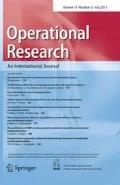Abstract
Satisfying the clients' uncompromising priorities is a challenge for decision makers of organizations that face multiple projects. This paper considers an organization with a multi-skilled workforce working on several predetermined projects under time-of-use energy tariffs where distributed load energy usage is the primary concern of energy suppliers. This paper also considers different time-of-use energy tariffs, which are among the most common strategies to reach a more balanced energy utilization. The problem is stated as a bi-objective mixed-integer programming model containing two conflicting objectives; to minimize the total cost of the multi-skilled workforce and obtain a sustainable schedule with minimum deviation from the projects' priorities. The problem is formulated mathematically, and the GAMS solver is applied for justifying the conflict between the objectives and validating the proposed formulation. In order to tackle real-life instances of the problem, intelligent algorithms based on cuckoo search, particle swarm, and genetic algorithms are developed. In the proposed algorithms, the application of a well-designed encoding and decoding structure efficiently ensures the generated solutions' feasibility. The Taguchi method is used for calibrating the parameters of the proposed meta-heuristics. Performance of the solving methods is evaluated based on some experiments, where ELECTRE method is utilized as a decision-making technique to prioritize the developed algorithms. To this aim, some well-known multi-objective measures are applied for comparative analysis of the results, where the supremacy of FSCS in terms of all metrics is declared.










Similar content being viewed by others
References
Afshar-Nadjafi B (2020) Multi-skilling in scheduling problems: a review on models methods and applications Comput Ind Eng https://doi.org/10.1016/j.cie.2020.107004
Alamaniotis M, Gatsis N, Tsoukalas LH (2018) Virtual Budget: Integration of electricity load and price anticipation for load morphing in price-directed energy utilization. Electric Power Syst Res 158:284–296
Bellenguez O (2008) Methods to solve multiskill project scheduling problem. 4OR Quart J Op Res 6:85–88
Bellenguez, O., Néron, E., (2005). Lower bounds for the multi-skill project scheduling problem with hierarchical levels of skills. International Conference on the Practice and Theory of Automated Timetabling Springer Berlin Heidelberg, 229–243
Bellenguez-Morineau O, Néron E (2007) A branch-and-bound method for solving multi-skill project scheduling problem. RAIRO-Op Res 41:155–170
Bhowmik C, Bhowmik S, Ray A, Murari K (2017) Pandey Optimal green energy planning for sustainable development: a review. Renew Sustain Energy Rev 71:796–813
Browning TR, Yassine AA (2010) Resource-constrained multi-project scheduling: Priority rule performance revisited. Int J Prod Econ 126:212–228
Cai, Z., Li, X., (2012). A hybrid genetic algorithm for resource constrained multi project scheduling problem with resource transfer time. In: Proceeding of the 2012 IEEE International Conference on Automation Science and Engineering, (CASE 2012), Seoul, 569–574.
Chakrabortty RK, Sarker RA, Essam DL (2016) Multi-mode resource constrained project scheduling under resource disruptions. Comput Chem Eng 88(8):13–29
Chen PH, Shahandashti SM (2009) Hybrid of genetic algorithm and simulated annealing for multiple project scheduling with multiple resource constraints. Autom Constr 18:434–443
Chen R, Liang C, Gu D, (2016) IT project portfolio scheduling and multi-skilled staff assignment with ant colony optimization algorithm. WHICEB 2016 Proceeding. 9
Cohen I, Golany B, Shtub A (2007) Resource allocation in stochastic, finite-capacity, multi-project systems through the cross entropy methodology. J Sched 10:181–193
Coello CAC, Lechuga MS, (2002) MOPSO: A proposal for multiple objective particle swarm optimization. Evolutionary Computation, 2002. CEC'02. Proceedings of the 2002 Congress on 2, 1051–1056
Coello Coello CA, Lamont GB and Van Veldhuizen DA (2007) Evolutionary algorithms for solving multiobjective problems
Deb K, Agrawal S, Pratap A, Meyarivan T, (2000) A fast elitist non-dominated sorting genetic algorithm for multiobjective optimization: NSGA-II International Conference on Parallel Problem Solving From Nature Springer, Berlin
Deb K, Pratap A, Agarwal S, Meyarivan TAMT (2002) A fast and elitist multiobjective genetic algorithm: NSGA-II. IEEE Trans Evol Comput 6:182–197
Dumond J, Mabert VA (1988) Evaluating project scheduling and due date assignment procedures: an experimental analysis. Manage Sci 34:101–118
Fırat M, Hurkens CAJ (2012) An improved MIP-based approach for a multi-skill workforce scheduling problem. J Sched 15:363–380
Fragnière E, Kanala R, Moresino F, Reveiu A, Smeureanu I (2017) Coupling techno-economic energy models with behavioral approaches. Oper Res Int J 17:633–647
Gandomi AH, Yang XS, Alavi AH (2013) Cuckoo search algorithm: a metaheuristic approach to solve structural optimization problems. Eng Comput 29(1):17–35
Gutjahr WJ, Reiter P (2010) Bi-objective project portfolio selection and staff assignment under uncertainty. Optimization 59:417–445
Hadera H, Harjunkoski I, Sand G, Grossmann IE, Engell S (2015) Optimization of steel production scheduling with complex time-sensitive electricity cost. Comput Chem Eng 76:117–136
Heimerl C, Kolisch R (2010) Work assignment to and qualification of multi-skilled human resources under knowledge depreciation and company skill level targets. Int J Prod Res 48:3759–3781
Jalal M, Goharzay M (2019) Cuckoo search algorithm for applied structural and design optimization: float system for experimental setups. J Comput Design Eng 6(2):159–172
Javanmard S, Afshar-Nadjafi B, Niaki STA (2017) Preemptive multi-skilled resource investment project scheduling problem: Mathematical modeling and solution approaches. Comput Chem Eng 96:55–68
Karimi N, Zandieh M, Karamooz HR (2010) Bi-objective group scheduling in hybrid flexible flowshop: a multi-phase approach. Expert Syst Appl 37(6):4024–4032
Kazemipoor H, Tavakkoli-Moghaddam R, Shahnazari-Shahrezaei P, Azaron A (2013) A differential evolution algorithm to solve multi-skilled project portfolio scheduling problems. Int J Adv Manuf Technol 64:1099–1111
Krüger D, Scholl A (2010) Managing and modelling general resource transfers in (multi-) project scheduling. OR Spectrum 32:369–394
Kumanam S, Raja K (2011) Multi-project scheduling using a heuristic and memetic algorithm. J Manuf Sci Prod 10:249–256
Laha D, Gupta JN (2018) An improved cuckoo search algorithm for scheduling jobs on identical parallel machines. Comput Ind Eng 126:348–360
Laszczyk M, Myszkowski PB (2019) Improved selection in evolutionary multi–objective optimization of multi–skill resource–constrained project scheduling problem. Inf Sci 481:412–431
Maghsoudlou H, Afshar-Nadjafi B, Niaki STA (2016a) A multiobjective invasive weeds optimization algorithm for solving multi-skill multi-mode resource constrained project scheduling problem. Comput Chem Eng 88:157–169
Maghsoudlou H, Kahag MR, Niaki STA, Pourvaziri H (2016b) Bi-objective optimization of a three-echelon multi-server supply-chain problem in congested systems: modeling and solution. Comput Ind Eng 99:41–62
Maghsoudlou H, Afshar-Nadjafi B, Niaki STA (2017) Multi-skilled project scheduling with level-dependent rework risk; three multiobjective mechanisms based on cuckoo search. Appl Soft Comput 54:46–61
Maghsoudlou H, Afshar-Nadjafi B, Niaki STA (2019) Preemptive multi-skilled resource constrained project scheduling problem with hard / soft interval due dates. RAIRO Op Res 53:1877–1898
Maghsoudlou H, Afshar-Nadjafi B, Niaki STA (2020) A framework for preemptive multi-skilled project scheduling problem with time-of-use energy tariffs. Energy Syst. https://doi.org/10.1007/s12667-019-00374-8
Mohammadi M, Noorollahi Y, Mohammadi-ivatloo B, Hosseinzadeh M, Yousefi H, Torabzadeh KS (2018) Optimal management of energy hubs and smart energy hubs – a review. Renew Sustain Energy Rev 89:33–50
Nezami FG, Heydar M (2019) Energy-aware Economic Production Quantity model with variable energy pricing. Oper Res Int J 19:201–218
Myszkowski PB, Skowroński ME, Olech ŁP, Oślizło K (2015) Hybrid ant colony optimization in solving multi-skill resource-constrained project scheduling problem. Soft Comput 19:3599–3619
Néron, E., (2002). Lower bounds for the multi-skill project scheduling problem. Proceeding of the Eighth International Workshop on Project Management and Scheduling 274–277.
Othman SB, Hammadi S, Quilliot A (2015) Multiobjective evolutionary for multi-skill health care tasks scheduling. IFAC-PapersOnLine 48:704–709
Pérez E, Posada M, Lorenzana A (2016) Taking advantage of solving the resource constrained multi-project scheduling problems using multi-modal genetic algorithms. Soft Comput 20:1879–1896
Pohekar SD, Ramachandran M (2004) Application of multi-criteria decision making to sustainable energy planning a review. Renew Sustain Energy Rev 8:365–381
Pritsker AAB, Waiters LJ, Wolfe PM (1969) Multi-project scheduling with limited resources: a zero-one programming approach. Manage Sci 16:93–108
Roy B (1991) The outranking approach and the foundations of Electre methods. Theor Decis 31:49–73
Shrouf F, Ordieres-Meré J, García-Sánchez A, Ortega-Mier M (2014) Optimizing the production scheduling of a single machine to minimize total energy consumption costs. J Clean Prod 67:197–207
Tabrizi BH, Tavakkoli-Moghaddam R, Ghaderi SF (2014) A two-phase method for a multi-skilled project scheduling problem with discounted cash flows. Scientia Iranica Trans E, Ind Eng 21:1083–1095
Taguchi G (1986) Introduction to quality engineering: designing quality into products and processes.
Taha RA, Daim T (2013) Multi-criteria applications in renewable energy analysis, a literature review. Research and Technology Management in the Electricity Industry, 17–30.
Tan M, Duan B, Su Y (2018) Economic batch sizing and scheduling on parallel machines under time-of-use electricity pricing. Oper Res Int J 18:105–122
Tarish H, See OH, Elmenreich W (2016) Dynamic residential load scheduling based on adaptive consumption level pricing scheme. Electric Power Syst Res 133:27–35
Tosselli L, Bogado V, Martínez E (2020) A repeated-negotiation game approach to distributed (re)scheduling of multiple projects using decoupled learning. Simul Model Pract Theory 98:101980
Wang H, Wang W, Sun H, Cui Z, Rahnamayan S, Zeng S (2017) A new cuckoo search algorithm with hybrid strategies for flow shop scheduling problems. Soft Comput 21(15):4297–4307
Wu MC, Sun SH (2006) A project scheduling and staff assignment model considering learning effect. Int J Adv Manuf Technol 28:1190–1195
Yang, XS, Deb, S (2009) Cuckoo search via Lévy flights. Nature & Biologically Inspired Computing. NaBIC 2009. World Congress, 210–214.
Yang XS, Deb S (2013) Multiobjective cuckoo search for design optimization. Comput Oper Res 40(6):1616–1624
Yildiz AR (2013) Cuckoo search algorithm for the selection of optimal machining parameters in milling operations. Int J Adv Manuf Technol 64(1):55–61
Zabihi S, Rashidi Kahag M, Maghsoudlou H, Afshar-Nadjafi B (2019) Multiobjective teaching-learning-based meta-heuristic algorithms to solve multi-skilled project scheduling problem. Comput Ind Eng 136:195–211
Zheng HY, Wang L, Zheng XL (2017) Teaching–learning-based optimization algorithm for multi-skill resource constrained project scheduling problem. Soft Comput 21:1537–1548
Zitzler, E., (1999). Evolutionary algorithms for multiobjective optimization: Methods and applications.
Funding
This research received no specific grant from any funding agency.
Author information
Authors and Affiliations
Corresponding author
Ethics declarations
Conflict of interest
There is no conflict of interest regarding the publication of this article.
Additional information
Publisher's Note
Springer Nature remains neutral with regard to jurisdictional claims in published maps and institutional affiliations.
Appendix
Appendix
Computational results of the proposed algorithms in terms of different metrics.
See Table 9, 10, 11, 12 and 13.
Rights and permissions
About this article
Cite this article
Javanmard, S., Afshar-Nadjafi, B. & Taghi Akhavan Niaki, S. A bi-objective model for scheduling of multiple projects under multi-skilled workforce for distributed load energy usage. Oper Res Int J 22, 2245–2280 (2022). https://doi.org/10.1007/s12351-021-00633-6
Received:
Revised:
Accepted:
Published:
Issue Date:
DOI: https://doi.org/10.1007/s12351-021-00633-6




